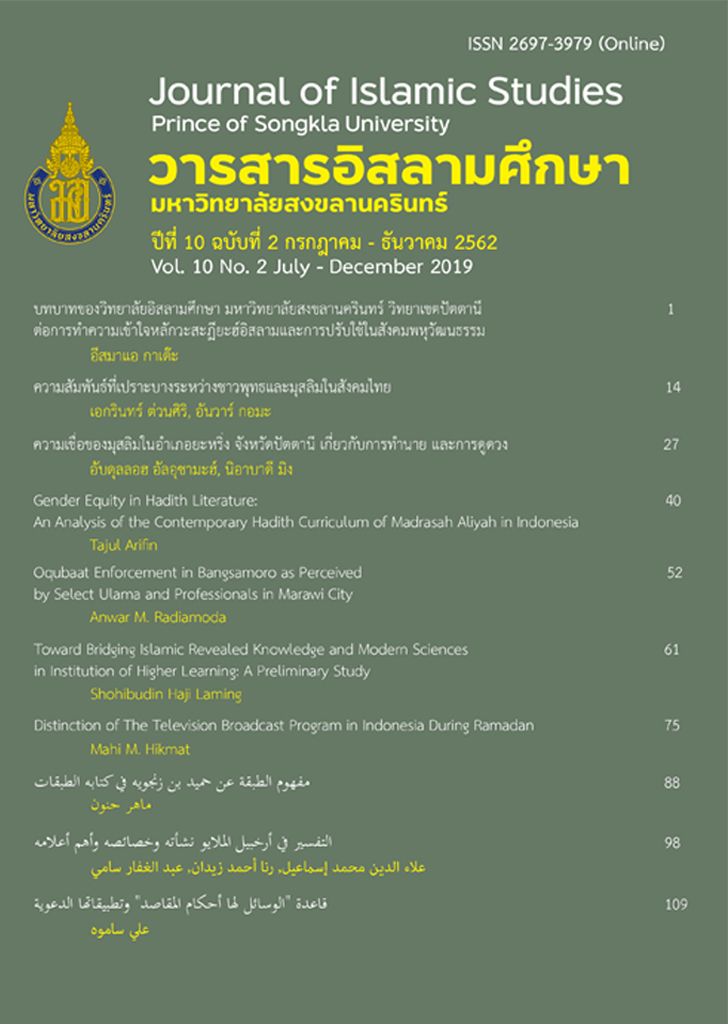Toward Bridging Islamic Revealed Knowledge and Modern Sciences in Institution of Higher Learning: A Preliminary Study
Keywords:
revealed knowledge, bridging, religion and modern science, higher learningAbstract
The process of bridging the Islamic revealed knowledge and modern sciences by proper educational method is a very important aspect in higher learning institution. In Islam, the idea of harmony and unity of religion and science is very much cherished. The harmony between religion and science is a major characteristic of Islamic civilization which develops and generates the human knowledge. In Islamic civilization, science was born in the cradle of religion. More precisely, it was born in the cradle of monotheism – belief in the one true God – or what Muslims traditionally love to call al-tawhid, which literally means unity. Islamic science grew and developed to become the most creative and the most advanced in the world for centuries until the seventeenth century, thanks to its nourishment by the teachings of monotheism or al-tawhid, which is at the heart of religion. This paper will focus on the religious sciences of the revealed knowledge which gives birth to the scientific spirit in its most comprehensive sense as we know it today. The origin and development of the scientific spirit in Islam differs from that in the West. Therefore, this article is trying to give the answers from the Institution of higher learning approach which caters introduction, the Concept of bridging of knowledge, science and Islamic revealed knowledge: rational approach, bridging between Islamic revealed knowledge and modern science, classical science in the Muslim world, arrival of modern science in the Muslim world and conclusion.
References
Ali, S. (2018). Science and the Qur'an" (PDF). In Oliver Leaman (ed.). The Qurʼan: An Encyclopedia. p.572.
Ansari, Z. I. (2001). "Scientific Exegesis of the Qur'an Journal of Qur'anic Studies. 3
Bakar, O. (1984). The Question of Methodology in Islamic Science, Muslim Education Quarterly, 2:1 (Autum 984), pp. 16-30.
Bakar, O. (1986). “The Meaning and Significance of Doubt in al-Ghazzali’s Philosophy,” The Islamic Quarterly, 30:1 (1986), pp. 20-31.
Bakar, O. (1999). Classification of knowledge in Islam: a study in Islamic Philosophies of Science. The Islamic Texts Society, Cambridge, United Kingdom.
Bakar, O. (2008). Tawhid and Science, Arah Pendididkan, Shah Alam: n.p.
Clayton, P. & Nasr, S. (2006). The Oxford Handbook of Religion and Science: Islam and Science. Oxford, New York: Oxford University Press.
Faruqi, I. R. (1986). The Cultural Atlas of Islam: McMillan Publishing Company.
Gingerich, O. (April 1986). Islamic astronomy, Scientific American, 254 (10): 74,1986SciAm.254d. 74G,10.1038/ scientificamerican0486-74, archived from the original on 2011-01-01, retrieved 2008-05-18.
Guessoum, N. (2010). Islam's Quantum Question: Reconciling Muslim Tradition and Modern Science. I.B.Tauris.
Haq, S. (2009). Science in Islam. Oxford Dictionary of the Middle Ages. Retrieved 2014-10-22.
Huff, T. (2007). Islam and Science. Armonk, New York: M.E. Sharpe, Inc.
La'li, M. (2007). A Comprehensive Exploration of the Scientific Miracles in Holy Quran. N.P.:Trafford Publishing. Moose, M. (1967). Revealed knowledge’s Role in the Transmission of Greek Knowledge to the Arabs, Journal of the Pakistan Historical Society 15 (1): 3–18.
Nasr, S. H. (1966). Science and Civilization in Islam, New American Library. N.P.: n.p.
Sayili, A. (1960). The Observatory in Islam and its place in the General History of the Observatory . Ankara: N.P.
Setia, A. (2004), Fakhr Al-Din Al-Razi on Physics and the Nature of the Physical World. Islam & Science, 2, archived from the original on 2012-07-10, retrieved 2010-03-02.
Downloads
Published
How to Cite
Issue
Section
License
Copyright (c) 2019 Journal of Islamic Studies, Prince of Songkla University

This work is licensed under a Creative Commons Attribution 4.0 International License.
All articles Published in The Journal of Islamic Studies are author’s opinions, and not the responsibility of the Faculty of Islamic Sciences nor the editorial board. However any citation should be referred to the journal.
















